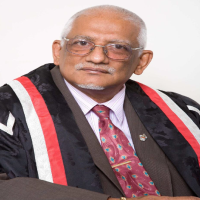
Clement K. Sankat
Work place: PVC/PRINCIPAL, The University of the West Indies, St. Augustine Campus @ TRINIDAD
E-mail: clement.sankat@sta.uwi.edu
Website:
Research Interests: Engineering
Biography
Clement K. Sankat is a member of the Executive Management Team of The University of the West Indies (UWI) and is currently Pro-Vice-Chancellor and Campus Principal of St. Augustine Campus since January 1, 2008. He is a great researcher and a great academic leader. He holds a Bachelor’s Degree (First Class Honours) and Master’s in Mechanical Engineering from the UWI and a Doctorate from the University of Guelph’s School of Engineering (Canada). Prof. Sankat is Chartered Engineer (CEng), a Fellow of the Institution of Agricultural Engineers (FIAgrE) of the UK and a Fellow of the Association of Professional Engineers of Trinidad and Tobago (FAPETT). He has been Dean of the Faculty of Engineering & Pro-Vice-Chancellor for Graduate Studies @ UWI.
He has been steadfast in supporting student centeredness and development, graduate-level training and in building capacity, promoting quality and accreditation for engineering education at the UWI in the Americas. Professor Sankat has for many years been actively involved in the application and promotion of Science and Technology (S & T) for national and regional development. He is a long serving member on the Board of Directors of the Caribbean Industrial Research Institute (CARIRI). For his efforts in Public Service, University Service and Research he was awarded in 2001, the UWI Vice Chancellor’s Award for Excellence. His accomplishments were also formally recognized by the University of New Brunswick which conferred on him an Honorary Doctoral Degree in 2010.
Author Articles
Decision-Making Using Efficient Confidence-Intervals with Meta-Analysis of Spatial Panel Data for Socioeconomic Development Project-Managers
By Ashok Sahai Clement K. Sankat Koffka Khan
DOI: https://doi.org/10.5815/ijisa.2012.09.12, Pub. Date: 8 Aug. 2012
It is quite common to have access to geospatial (temporal/spatial) panel data generated by a set of similar data for analyses in a meta-data setup. Within this context, researchers often employ pooling methods to evaluate the efficacy of meta-data analysis. One of the simplest techniques used to combine individual-study results is the fixed-effects model, which assumes that a true-effect is equal for all studies. An alternative, and intuitively-more-appealing method, is the random-effects model. A paper was presented by the first author, and his co-authors addressing the efficient estimation problem, using this method in the aforesaid meta-data setup of the ‘Geospatial Data’ at hand, in Map World Forum meeting in 2007 at Hyderabad; INDIA. The purpose of this paper had been to address the estimation problem of the fixed-effects model and to present a simulation study of an efficient confidence-interval estimation of a mean true-effect using the panel-data and a random-effects model, too in order to establish appropriate ‘confidence interval’ estimation for being readily usable in a decision-makers’ setup. The present paper continues the same perspective, and proposes a much more efficient estimation strategy furthering the gainful use of the ‘Geospatial Panel-Data’ in the Global/Continental/ Regional/National contexts of “Socioeconomic & other Developmental Issues’. The ‘Statistical Efficient Confidence Interval Estimation Theme’ of the paper(s) has a wider ambit than its applicability in the context of ‘Socioeconomic Development’ only. This ‘Statistical Theme’ is, as such, equally gainfully applicable to any area of application in the present world-order at large inasmuch as the “Data-Mapping” in any context, for example, the issues in the topically significant area of “Global Environmental Pollution-Mitigation for Arresting the Critical phenomenon of Global Warming”. Such similar issues are tackle-able more readily, as the impactful advances in the “GIS & GPS” technologies have led to the concept of “Managing Global Village” in terms of ‘Geospatial Meta-Data’. This last fact has been seminal to special zeal-n-motivation to the authors to have worked for this improved paper containing rather a much more efficient strategy of confidence-interval estimation for decision-making team of managers for any impugned area of application.
[...] Read more.Other Articles
Subscribe to receive issue release notifications and newsletters from MECS Press journals